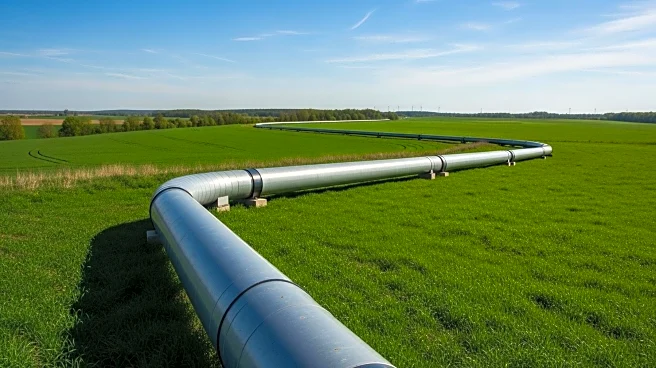What is the story about?
What's Happening?
Tallgrass Energy is set to activate a $1.5 billion carbon dioxide pipeline, transporting CO2 from ethanol plants in Nebraska and Iowa to a sequestration site in Wyoming. The pipeline, a converted natural gas line, aims to reduce carbon emissions and enhance the environmental profile of ethanol production. Tallgrass has announced a $500,000 initial donation to a community fund managed by the Nebraska Community Foundation, benefiting over 230 communities along the pipeline route. The fund will support local initiatives such as early childhood centers, elder care facilities, and food pantries, with projected distributions exceeding $7 million over 10 years.
Why It's Important?
The pipeline represents a significant step in the Biden Administration's efforts to make ethanol production more sustainable, potentially increasing its appeal as a biofuel. By reducing the carbon intensity of ethanol, the pipeline could open new markets, such as sustainable aviation fuel, benefiting Nebraska's agricultural sector. The community investment fund reflects a growing trend of infrastructure projects contributing to local development, addressing social challenges like education and food insecurity. This model of community engagement may influence future projects, fostering cooperation between companies and rural communities.
What's Next?
As the pipeline begins operations, Tallgrass Energy will continue to distribute funds to eligible communities, supporting local services and infrastructure. The initiative may serve as a blueprint for other infrastructure projects, encouraging companies to invest in affected communities. Stakeholders, including environmental groups and local governments, will likely monitor the pipeline's impact on carbon emissions and community development.
Beyond the Headlines
The project highlights the intersection of environmental sustainability and community development, demonstrating how infrastructure can contribute to social welfare. It raises questions about corporate responsibility and the role of private companies in supporting public services. The collaboration with Bold Nebraska, an environmental group, suggests a shift towards more inclusive decision-making processes in large-scale projects.















